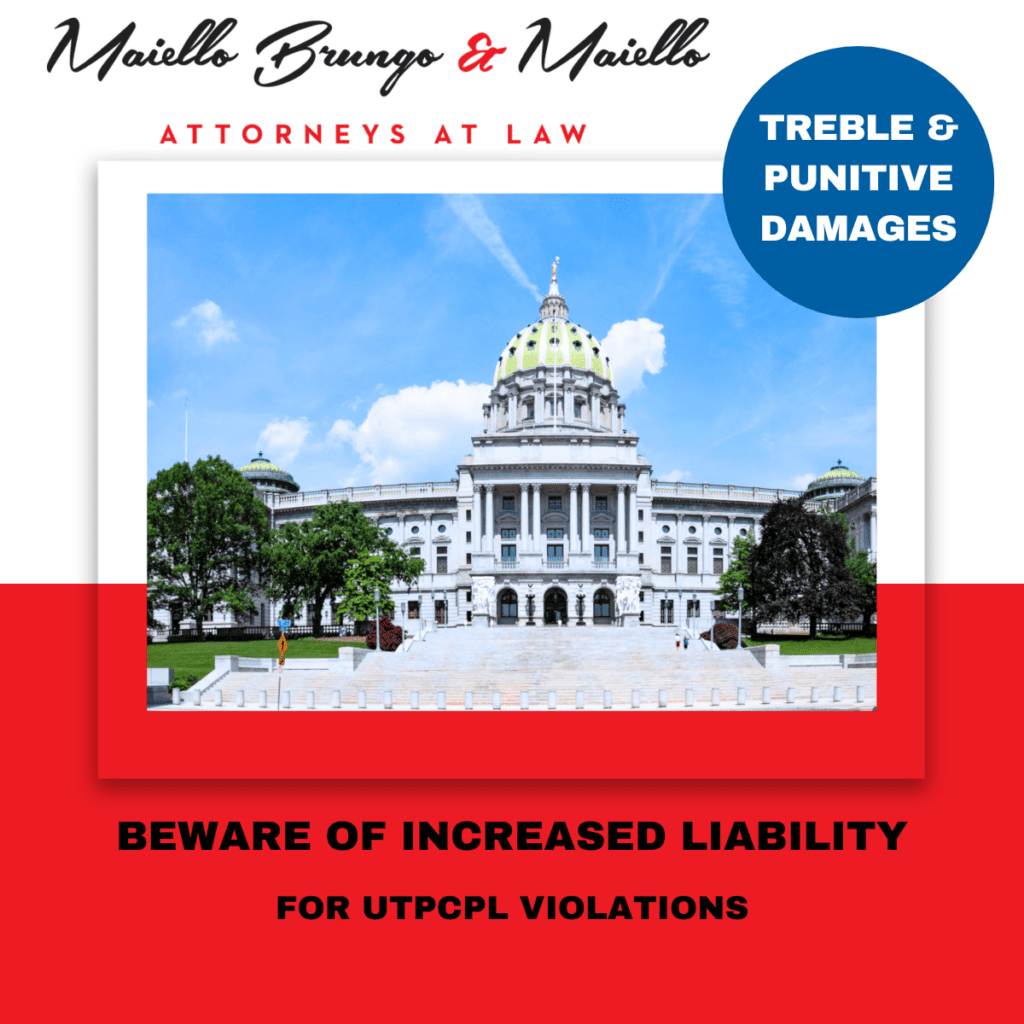The Supreme Court of Pennsylvania’s recent decision in Dwyer v. Ameriprise Financial, Inc., No. 2 WAP 2023 (Pa., Apr. 25, 2024) has significant implications for businesses and practitioners operating in Pennsylvania. This ruling reinforces the Unfair Trade Practice and Consumer Protection Law (UTPCPL) and potentially increases financial consequences for companies engaging in unfair or deceptive practices.
Need help with treble damages and punitive damages in Pennsylvania? MBM Law’s experienced business attorneys can provide legal guidance.
Contact MBM Law Business Attorneys
Treble Damages and Punitive Damages Under the UTPCPL
The UTPCPL is a comprehensive consumer protection law designed to protect plaintiffs from unethical conduct, fraudulent business practices, and false advertising. If a plaintiff files a cause of action for a violation of the UTPCPL, the plaintiff can seek an award for treble damages – that is, the plaintiff can be awarded whatever compensatory damages they had by a multiple of three. Additionally, the plaintiff can seek a claim for punitive damages – which can be as much as ten (10) times the award for compensatory damages for violations of the UTPCPL.
Claims for punitive damages involve allegations of fraudulent misrepresentation, fraudulent concealment, or reckless behavior based on outrageous conduct of the defendant business owner or practitioner.
The Dwyer v. Ameriprise Case
In Dwyer v. Ameriprise Financial, Inc., the state’s Supreme Court awarded both treble damages and punitive damages. This begs the question: “How is this not considered excessive”
The Initial Purchase
In the Dwyer case, spouses Earl and Christine Dwyer purchased a life insurance policy from Ameriprise in 1985, based on alleged misrepresentations about premium costs made by Ameriprise’s employees. The Dwyers alleged that Ameriprise fraudulently and negligently induced them to purchase a universal whole life insurance policy for Earl Dwyer, by misrepresenting that their quarterly premium payments would remain the same for the life of the policy. The policy included a rider insuring Christine and the Dwyer’s children. To facilitate the payment and funding of this policy, the Dwyers surrendered policies they had purchased from other life insurance companies.
Discovery of the Class Action Lawsuit
In the year 2000, however, the Dwyers received notice of a pending class action lawsuit that spoke to the idea that the policy they had purchased may have been done so subject to misrepresentation and possible fraudulent conduct on the part of Ameriprise. Armed with this information then, the Dwyers then sued Ameriprise seeking treble damages under the UTPCPL and punitive damages for fraudulent conduct.
UTPCPL Violation and Punitive Damages
At trial, the jury found that Ameriprise acted fraudulently and awarded punitive damages for the Dwyers. The judge also found that Ameriprise violated certain consumer protection safeguards under the UTPCPL, but the judge declined to award treble damages, expressing that the punitive damages were enough of a deterrent to ward off such conduct in the future.
Appeal to Superior Court of Pennsylvania
The Dwyers sought an appeal, and the Superior Court of Pennsylvania affirmed the trial court decision, leaving the jury and trial court’s awards undisturbed and unchanged. The case progressed to the Supreme Court of Pennsylvania.
PA Supreme Court Decision: UTPCPL Treble Damages
The Pennsylvania Supreme Court ruled that treble damages under the UTPCPL are separate from and independent of punitive damages for common law claims like fraud. The court held that trial courts must consider awarding treble damages under the UTPCPL regardless of whether punitive damages were already awarded for related claims. Rather than being interchangeable with punitive damages, treble damages under the UTPCPL was a separate remedy available to the Dwyers.
Request a PA Business Lawyer Consultation
Pennsylvania Consumer Protection Law: A New Standard for Consumer Protection
The nuance of the Dwyer case compared to other like cases, is its broad remedial interpretation. It establishes:
1. Separate Remedies
- Treble damages under consumer protection laws and punitive damages for fraud are distinct remedies that serve different purposes.
2. Concurrent Consideration
- Trial courts may consider awarding treble damages under the UTPCPL independently, even if punitive damages were already awarded.
3. Consumer Protection
- This decision strengthens consumer protection by allowing for potentially greater financial penalties against companies that engage in fraudulent practices.
4. Non-Exclusive Remedies
- Awarding both treble damages and punitive damages are not considered exclusive remedies with respect to each other, as they serve different legal purposes.
Increased Liability for Pennsylvania Businesses
Based on the Dwyer v. Ameriprise Financial ruling, businesses operating in Pennsylvania now face the possibility of paying both punitive and treble damages for the same conduct, potentially resulting in larger awards in consumer protection cases.
Mitigating Risks for PA Businesses
To mitigate risks, businesses should:
- Be more cautious in their marketing practices, avoiding any claims of deception or misrepresentation that could trigger UTPCPL liability.
- Enhance employee training on consumer protection laws and ethical sales practices to mitigate risk.
- Revise risk assessment by adjusting strategies for handling consumer complaints.
- Implement robust documentation practices for consumer interactions and transactions to defend against potential claims.
Protect Your Business with Legal Counsel in Pennsylvania
MBM’s Business Law Team can assist you in developing comprehensive strategies to address these concerns and potential legal exposure under the UTPCPL.


